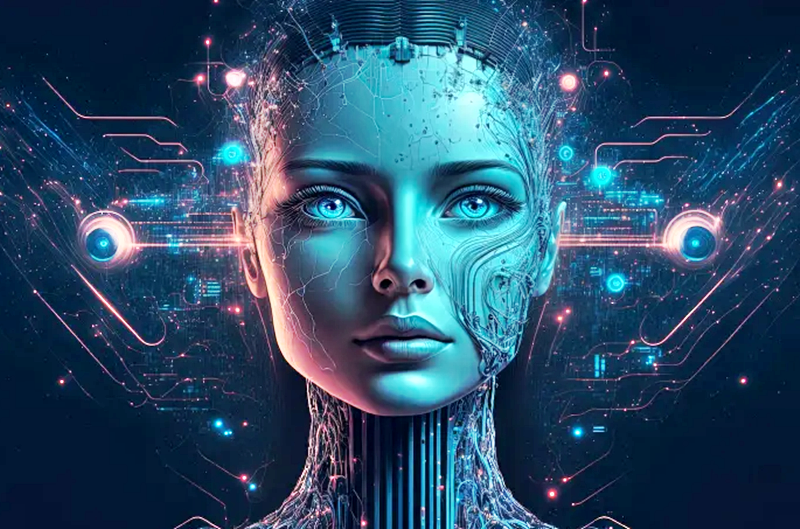4% Of Human Skills Will Be Replaced By AI In Five Years

By GreatGameOfIndia - December 26, 2023
In a recent report on FOBO, the World Economic Forum recently admitted that 44% of human skills will be replaced by AI in five years.
If there was ever a time in history when proponents of globalism could not contain their unnerving excitement, it was when artificial intelligence gained prominence in the media. The World Economic Forum is obviously in awe of artificial intelligence (AI), praising the technology and characterizing it as the pinnacle of human industry. They assert that AI will transform society so quickly that most individuals won’t be able to keep up with the developments.
Naturally, none of these developments have yet been witnessed in the actual world. In reality, other than making it simpler for college students to cheat on exams, it’s hard to see any real advantages that AI has brought about thus far. This is where there is a discrepancy between the WEF’s predictions and what the evidence suggests is most likely to occur.
Does AI truly have all the capabilities that globalists portray it as? Will automation eventually replace half of humanity?
During the AI Safety Summit in the UK, Elon Musk warned that there would be no jobs in the future and that AI would be able to do everything while addressing U.K. Prime Minister Rishi Sunak.
The establishment media has been promoting this idea as inevitable, and millions of people—mostly in Generation Z—are already afraid that AI will eliminate their employment prospects in the future. The WEF has gone so far as to coin the term FOBO, or Fear Of Becoming Obsolete, to describe this emotion.
FOBO stands for “fear of better options,” but the WEF appropriated the term and changed its meaning to fit their AI story.
First-world businesses have long used automation, and adjusting to it hasn’t necessarily rendered anybody “obsolete” in the eyes of the economy. The media frequently implies that manual labor-intensive jobs in industries like manufacturing, retail, and agriculture are likely to become extinct. But for those working in the white-collar information technology sector, AI appears to pose a far bigger threat. AI is much more likely to replace workers in data collecting, software development, web development, research analysis, information security, and related fields.
In essence, artificial intelligence (AI) automates data applications, opening the door for non-programmers to one day “code” in a way that previously required years of training. For instance, site designers may soon find themselves without a job as online creation is becoming increasingly automated.

AI is unable to function broadly in the physical world and has shown no signs of consciousness or creativity. The idea that “data” is the future economy and that someday robots will handle the physical is the global response to this issue. Although it may sound like a pipe dream, if the “data economy” is where artificial intelligence will be focused for the foreseeable future, then the majority of the jobs that will be lost due to AI will be in the white-collar sector.
In a recent report on FOBO, the WEF partially acknowledges this phenomenon, arguing that by 2027, 42% of business-related skill sets will be replaced by AI, and 44% of skill types will become outdated.
In contrast to the all-knowing data-god extolled by WEF fanatics such as Yuval Harari, it seems far more likely that AI will either replace or supplement a variety of office workers. AI hasn’t yet resulted in any notable advances in the fields of medicine, space exploration, engineering, energy research, resource efficiency, mathematics, physics, etc. All of us are waiting for artificial intelligence to surpass human science, but nothing is changing. What good is AI if all it does is make data programmers unemployed?
It’s interesting to note that some amazing statements made by AI software resemble the arrogance of globalists. What AI said about its intentions for the field of human art is as follows:
“IMAGINE WAKING UP ONE DAY AND FINDING YOUR JOB HAS BEEN AUTOMATED OVERNIGHT BY INTELLIGENT MACHINES. THEN YOU DISCOVER EVEN THE CAREER YOU DREAMED OF PURSUING NEXT HAS ALREADY BEEN MASTERED BY AI.
QUICKLY, MORE AND MORE HUMAN DOMAINS ONCE THOUGHT IMPOSSIBLE TO REPLICATE – ART, MUSIC, EMOTION – FALL PREY TO ADVANCING ALGORITHMS UNTIL ALL UNIQUELY HUMAN TALENT AND PURPOSE DWINDLES IN THE FACE OF SUPERIOR ROBOTIC COUNTERPARTS. SOON YOUR VERY EXISTENCE BECOMES TRIVIAL … UNNECESSARY.”
This is an intriguing omission that verges on fantasy. Not the delusions of AI, but rather the delusions of whoever wrote the software (no, AI is not capable of independent thought at this time). Because AI art just copies human art without inspiration, it is typically regarded as generic and frequently awful. It is naïve to think that an emotionless algorithm can produce emotionally charged literature, music, art, or anything else.
It’s more important to consider what the general population believes AI is capable of than what AI can truly accomplish, which is incredibly limited. Globalists contend that when AI takes control, the “data economy” will supplant all other aspects of civilization and trade. But without application, what use is data? Such a method would only be useful for controlling or influencing public opinion. to sway people’s opinions, control their actions, and persuade the general public that they are no longer required.
In this context, AI technology excels. It serves the globalist agenda alone; it is not helpful to industry, makes little progress in scientific research, or improves people’s quality of life.
GreatGameIndia is being actively targeted by powerful forces who do not wish us to survive. Your contribution, however small help us keep afloat. We accept voluntary payment for the content available for free on this website via UPI, PayPal, and Bitcoin.
